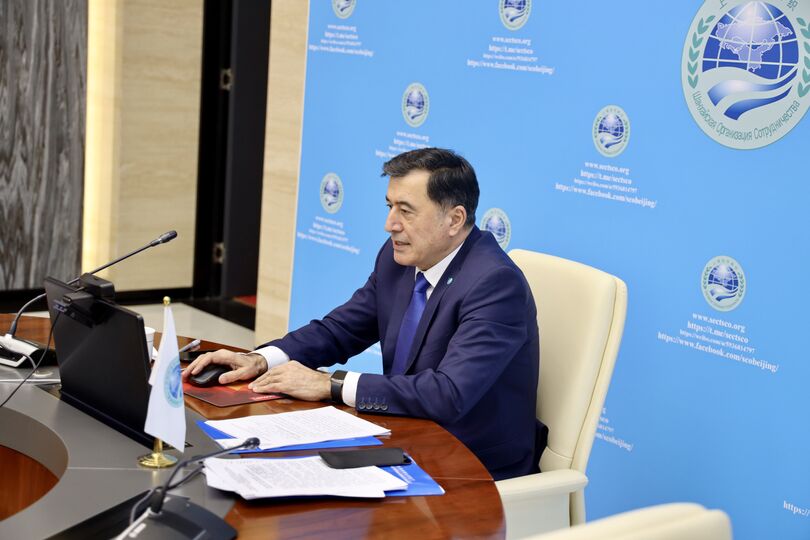On 27 October 2020 the SCO Secretariat, together with National University of Singapore (NSU), held an online conference titled SCO: Transformation of Eurasia.
The event attracted about 80 participants from research institutions in China, Singapore and other Eurasian countries. Director of the NSU Middle East Institute, former Ambassador Extraordinary and Plenipotentiary of Singapore to the Russian Federation and Singapore's Permanent Representative to the United Nations Bilahari Kausikan moderated the discussion.
During his presentation, SCO Secretary-General Vladimir Norov spoke about the SCO as an important factor for ensuring stability and sustainable development in the Eurasian space. He started with a brief overview of the organisation's history and how it emerged as one of the largest trans-continental associations, and went on to share its success story in the field of security and combating drug trafficking.
"SCO's Regional Anti-Terrorist Structure (RATS) has been praised by specialised international structures for its efforts, including by the United Nations Security Council Counter-Terrorism Committee Executive Directorate, the United Nations Office of Counter-Terrorism and the Interpol.
Fighting drug trafficking is another key sphere of cooperation within the SCO. The three-stage advisory mechanism enables the competent authorities of the SCO member states to carry out the SCO Anti-Drug Strategy and the related Action Programme, both adopted in 2018.
By working together, the counternarcotics agencies of our countries have been able to seize up to 40 percent of all opioids confiscated across Eurasia," Vladimir Norov pointed out.
In this context, the SCO Secretary-General emphasised the importance of promoting a settlement in Afghanistan as one of the key factors for strengthening security and stability across the SCO space. Vladimir Norov noted that during the Meeting of the SCO Council of Foreign Ministers on 10 September 2020 in Moscow, the parties reaffirmed their commitment to working within the framework of the SCO-Afghanistan Contact Group and implementing its roadmap. "We will focus our efforts to carry out this document on stepping up coordination with officials in Kabul on counter-terrorism matters, fighting drug production and trafficking, illegal migration, as well as promoting economic recovery in Afghanistan together with cultural and humanitarian ties."
Speaking of the SCO at the current development stage, the Secretary-General noted that the organisation was advancing a partnership cooperation model. He described this approach as the first time in history that different sized countries, with various economic and political potential, and with their unique cultures and civilizations, came together to promote equitable cooperation. "It may be the unique institutional structure of the SCO that underpins its unique role in the Eurasian space," Mr Norov pointed out.
The Secretary-General went on to say that expanding the organisation's trade and economic potential should be a priority. In this context, it is essential to draw member states into processes related to promoting connectivity between the Belt and Road Initiative and the Greater Eurasian Partnership, the two major cross-border projects. They are expected to link major European markets to countries in the Persian Gulf, Central and Southern Asia and the Far East, as well as strengthen Eurasia's transport and logistics potential.
Speaking of the coronavirus pandemic, Vladimir Norov said that the SCO has established itself as an effective platform for fighting sudden epidemiological outbreaks and has been praised internationally for its efforts, including by the UN Secretary General, ASEAN countries, the European Union, the OSCE and the Arab League. The SCO member states were also praised for their efforts and the measures they have been taking in fighting the pandemic.
In this context, the Secretary General emphasised that participants in the upcoming SCO Heads of State Council meeting are expected to approve a comprehensive action plan for fighting the epidemic, which provides for carrying out joint research, developing vaccines and effective treatment methods, as well as approve the next five-year Action Plan to Implement the SCO Development Strategy until 2025, which includes 150 practical events to further develop SCO operations in various fields. Special attention as part of this plan will be paid to post-pandemic economic recovery.
Speaking of developing the SCO's transport potential, the Secretary-General informed the participants on proposals to set up special green corridors for transit shipments in order to streamline imports and exports of essential goods and PPE, as well as to create an agile mechanism for creating food banks as part of the efforts to implement the SCO Food Security Programme for ensuring stability in agricultural supplies and markets within the region.
In conclusion, the Secretary-General noted the importance of SCO-ASEAN cooperation, and proposed stepping up security cooperation, including cyber security, and working with young people to prevent them from becoming involved in criminal activities, facilitate their socialisation and empower them to fulfil their creative potential, and to promote dialogue among cultures and civilisations.
Mr Norov also answered questions from the audience on promoting cooperation within the SCO family, the current relations between China and other world powers, as well as the SCO economic, cultural and humanitarian activities.
